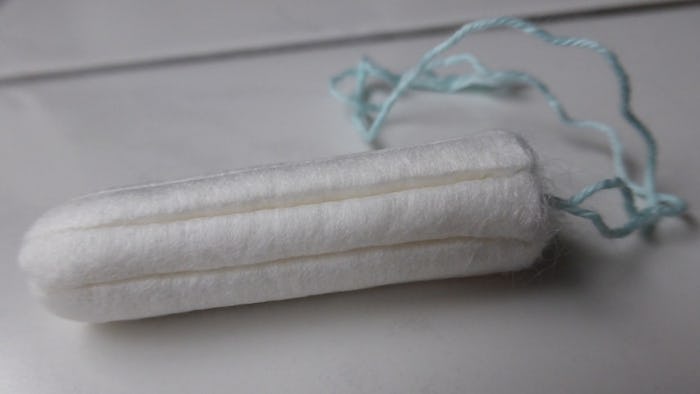There has been a groundbreaking discovery in women's health technology. An engineer from Harvard named Ridhi Tariyal has invented a "smart" tampon to help women monitor their health. This tampon is intended to gather information from women's menstrual flow to identify any potential health concerns, and offer the possibility of at-home monitoring for fertility testing, among other things, according to The New York Times. Wondering where can you buy this "smart" tampon? Unfortunately, it's going to be something of a wait.
Tariyal has been working on the concept of a "smart" tampon since 2014, when she was researching different ways for women to track reproductive disorders and "silent" infections on their own, according to the Times. These silent infections can include endometriosis, chlamydia, and gonorrhea, which can affect a woman's ability to bear children over time. That's why Tariyal and her business partner, Stephen Gire, wanted to develop a method to help women obtain actionable information before it's too late. And menstrual blood should provide a wealth of fertility data. As Tariyal told the Times:
I was trying to develop a way for women to monitor their own fertility at home, and those kinds of diagnostic tests require a lot of blood. So I was thinking about women and blood. When you put those words together, it becomes obvious. We have an opportunity every single month to collect blood from women, without needles.
The blood collected from the "smart" tampon is intended to be sent for testing to a database to check for these invasive, often silent infections. While Tariyal holds the patent for the new "smart" tampon (no simple feat when you realize that more than 92 percent of patents are held by men, according to a 2012 study), the product isn't expected to hit the streets until 2019 or 2020. The product is still in the trial phase. Tariyal explained to Fast Company:
We have to get to a place where we have working, high-quality tests for enough conditions that it actually makes it worthwhile for women to test themselves every month. Our vision is to manage reproductive health from menarche to menopause. We're thinking about all the ways that women could find data about their bodies useful.
The process to afford women the opportunity to access information about their own fertility health has been a long, arduous road for Tariyal and Gire; the medical community has long kept women in the dark until they have already tried (and failed) to conceive on their own. Only then do some doctors give women the information they need. Tariyal explained this tendency towards secrecy when it comes to women's fertility to Fast Company:
There's a sense in which these tests are paternalistic. Women don't like it when someone tells them when to worry or when not to worry. I wanted that number regardless of whether I was in a relationship or trying to get pregnant. That number belongs to me.
And in the relatively near future, that number will be available to women through their "smart" tampon.
